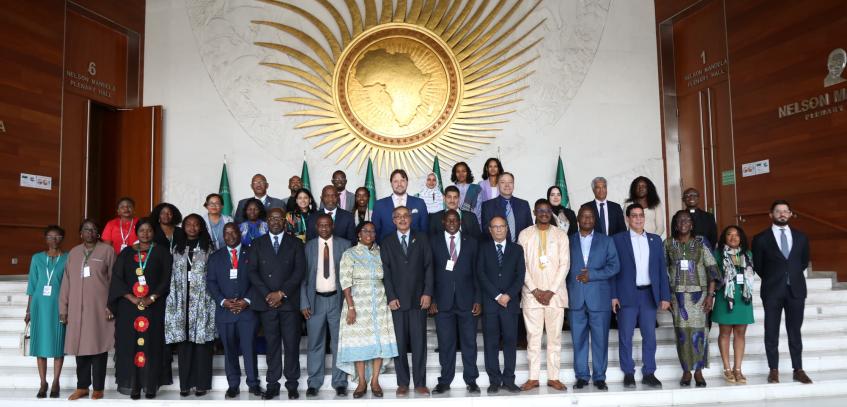African Union Member States, development partners and key stakeholders have committed to further promoting girls’ education on the continent as one of the key drivers for development. This was made during the African Union CIEFFA’s annual High-level dialogue on gender equality in education taking place on February 11, 2025, at the African Union Commission Headquarters.
The 9th edition of the High-Level Dialogue was attended by the Ministers of Education from the Central African Republic, Sahrawi Arab Democratic Republic, and the Republic of Sierra Leone, as well as education and gender experts from the AU member states. While officially opening the event, Dr Mangani Katundu, Secretary for Education, representing the Minister of Basic and Secondary Education for Malawi, Chair of the STC on Education, Science, and Technology made a call to their sister Member States to prioritise girls’ education. “Let us make a collective commitment to prioritize gender equality in education and to take concrete actions to achieve this goal. Let me congratulate countries that have criminalised child marriage to safeguard the education of the girl-child in Africa as Malawi has already done”, he asserted. Other participants included representatives of development partners, UN Agencies, International NGOs, Academia, CSOs, Religious and traditional leaders and Youth representatives.
Prof. Saidou Madougou, Director of the AUC Department of Education Science, Technology, and Innovation (ESTI), while delivering opening remarks on behalf of ESTI’s Commissioner highlighted key focus areas in girls’ education. “Indeed, this can be done through different measures and interventions, namely, through direct financial investment in education systems, deliberate policy reform, investment in safe schools, infrastructure development, ensuring affordability of sanitary pads for adolescent girls and all female learners, WASH facilities in schools, and generation of gender-responsive data and evidence in education which will systematically contribute to retaining them at school for continued and deeper learning”, he stated. Also present at the ceremony was Ms. Anna Mutavati, Regional Director for UN Women ESARO and a video-assisted message from Stefania Giannini, Assistant Director General for Education, UNESCO.
During the event, the first Continental Report on the Status of Girls and Women’s Education in Africa was launched and an overview was presented by Simone Yankey, African Union CIEFFA’s Ag. Coordinator and Fabricia Devignes, Senior Education Specialist, UNESCO IIEP. This maiden report, co-published by the African Union CIEFFA and UNESCO IIEP, presents a comprehensive cross-country analysis of the state of girls' education on the continent.
A developing report by the African Union CIEFFA and UNESCO IICBA on “Improving education for girls in Africa: the importance of foundational learning and teacher professional development” was presented by Dr Quentin Wodon, UNESCO IICBA’s Director and Eyerusalem Azmeraw from UNESCO IICBA.
Other stakeholders including representatives from UNESCO and its specialised offices, WFP, Gender at the Center Initiative (GCI), UNAIDS, UN Women, FAWE, Bakhita Partnership for Education, Plan International, World Vision International, Girls Not Brides, and Oxfam in Africa shared their work in advancing girls’ education in Africa.
The recommendations, which were delivered by Hon. Sarjoh Aziz-Kamara, Deputy Minister of Technical and Higher Education, Sierra Leone, were made, amongst others, to encourage AU Member States to own and disseminate the Report on the Status of Girls' Education in Africa, strengthen Legal & Policy Frameworks for Gender-responsive Education Systems, scale up public and private investments in safe schools for girls, and continue efforts and initiatives to increase school enrollment rates, fostering gender-inclusive curriculums, leveraging digital transformation and Artificial intelligence.








